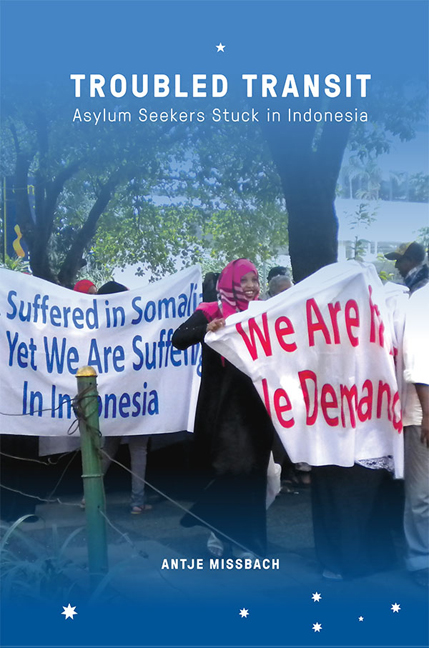Book contents
- Frontmatter
- Contents
- List of tables
- Acknowledgements
- Map of Indonesia
- Acronyms and Initialisms
- 1 Introduction
- 2 Transiting Indonesia: Past and Present
- 3 The Politics of Detention
- 4 Life on Hold
- 5 The Limits of Protection
- 6 Indonesia as a Transit State: Obligations, Policies, and Practice
- 7 Tidal Ebb and Flow: The Indonesia-Australia Relationship
- 8 Selling Hope
- 9 Conclusion
- Bibliography
- Index
- About the Author
- Frontmatter
- Contents
- List of tables
- Acknowledgements
- Map of Indonesia
- Acronyms and Initialisms
- 1 Introduction
- 2 Transiting Indonesia: Past and Present
- 3 The Politics of Detention
- 4 Life on Hold
- 5 The Limits of Protection
- 6 Indonesia as a Transit State: Obligations, Policies, and Practice
- 7 Tidal Ebb and Flow: The Indonesia-Australia Relationship
- 8 Selling Hope
- 9 Conclusion
- Bibliography
- Index
- About the Author
Summary
I am still alive; I have got near death.
… our boat sank and split into two and the water
got in and we all drank sea water, but we are still alive.
(SMS from Ali, 15 April 2012)
“STRANGERS” IN “PARADISE”
In April 2012 a wooden boat with thirty-four Somalis on board was stranded on the tropical island of Sumbawa in the geographic heart of the Indonesian archipelago. After two days of a disastrous journey headed for Australia that started on the island of Lombok, the boat had not moved very far from its initial point of departure. While other departure points for clandestine journeys to the “lucky country” have come under stricter border control in recent years, people smugglers have chosen Lombok as an alternative, despite the greater distance from Australia which makes the voyages even more dangerous. Not only are the boats that the asylum seekers use usually overcrowded, unseaworthy and crewed mostly by young and inexperienced Indonesians, but they sometimes even lack appropriate navigation equipment. The Somalis did not have good luck. On the very first day of the journey a storm hit and treated the boat — twelve metres long by three metres wide — like a nutshell in the ocean. After the engine and the pumps failed, people on board had to bail water to prevent the boat from going down. Unlike the many before them who had drowned on similarly dangerous passages, the Somalis were lucky in one respect: a larger Indonesian ship discovered them and towed them back to the shore, where the police arrested them not long after.
Among these Somalis was a young man, Ali. I had befriended Ali several months earlier when I spent time in Cisarua, a mountainous village in West Java that serves as a reception area for asylum seekers, recognized refugees and other undocumented migrants. While Ali's story is in many ways unique, it also represents the more common experiences of asylum seekers in transit in Indonesia. Thus, it is worth introducing Ali in detail.
After losing a lawsuit, a group of vigilantes from another clan killed Ali's father in his shop in Jowhar (central Somalia) and threatened the rest of the family. Ali's mother decided that it would be best if Ali left the country as soon as possible.
- Type
- Chapter
- Information
- Troubled TransitAsylum Seekers Stuck in Indonesia, pp. 1 - 28Publisher: ISEAS–Yusof Ishak InstitutePrint publication year: 2015



